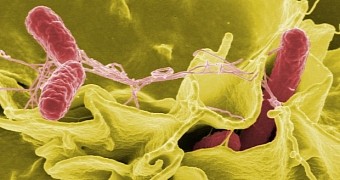A recent paper in the American Society for Microbiology's journal mBio details plans to use a genetically engineered form of the otherwise potentially lethal Salmonella bacterium to treat cancer.
As explained by researcher Roy Curtiss and his colleagues, Salmonella is known to cause severe cases of food poisoning, sometimes even sepsis and death.
The thing is that, according to recent studies, a specific Salmonella strain, i.e. Salmonella enterica Serovar Typhimurium, also does a great job infiltrating cancer tumors and killing them.
Since it can prove lethal, this Salmonella strain cannot be administered as such to cancer patients. Instead, researchers are now trying to genetically engineer it to make it more people-friendly.
So far, they've found that toying with the makeup of the bacterium's outer membrane could make the bug less toxic while at the same time not hindering its ability to fight cancer.
In fact, it looks like one such genetically engineered mutant Salmonella strain has already been documented to shrink tumors but not cause disease when administered to lab mice.
According to specialist Roy Curtiss and his team, the same mutant Salmonella strain also performed well when human cancer cells grown in laboratory conditions were exposed to it.
Although there is plenty of work left to do before moving on to clinical trials, the scientists expect Salmonella will one day be used together with chemotherapy and radiation therapy to treat cancer.

 14 DAY TRIAL //
14 DAY TRIAL //